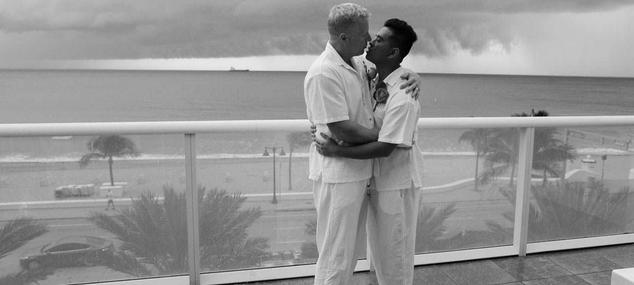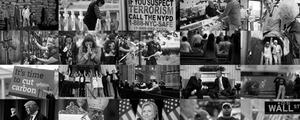Attitudes about same-sex marriage have undergone a rapid shift in American society. As recently as 2009, 40% of Americans said they believed that marriage between same-sex individuals should be legal and recognized by law as valid. Those views burst through the majority level in 2011, with support reaching a high of 55% in Gallup's annual Morals and Values survey in 2014. We will have an update on these attitudes in the next couple of weeks with data from the May 2015 Morals and Values survey.
Support or opposition to the legalization of same-sex marriage is highly related to a number of demographic characteristics in the population, the most significant of which are religion and partisanship.
The table below is based on more than 4,000 Gallup interviews conducted between 2012 and 2014 in which the legalization of same-sex marriage question was asked. The average support for legalized same-sex marriage across these interviews was 54%. But support shifts from 29% among Americans who attend religious services once a week to 75% among those who never attend religious services. This represents a 46-percentage-point spread between the two extremes of groups defined by their religiosity.
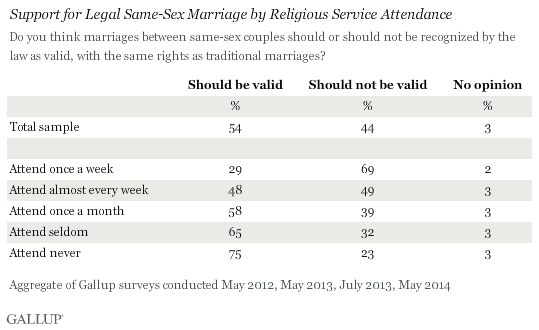
A few years ago, we asked those who opposed the legalization of same-sex marriage to explain their position in their own words. Almost half mentioned religion or the teachings of the Bible in response as their primary justification for their position.
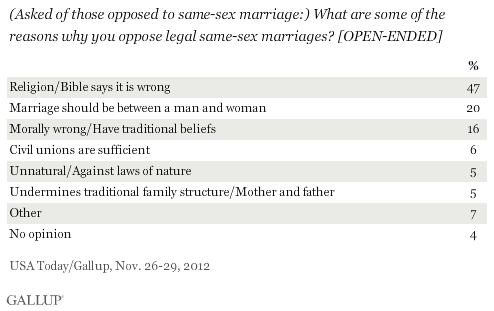
This strong relationship between religiosity and approval of same-sex marriage creates important cross currents within some segments of the U.S. population. One of these segments is the black population. More than eight in 10 black Americans identify as Democrats or say they lean Democratic, 34 percentage points higher than the national average of 47%. We know that partisanship is highly related to attitudes about same-sex marriage, with 74% of Democrats and Democratic leaners approving compared with 32% among Republicans and Republican leaners.
But blacks in the U.S. are also highly religious. Forty-five percent of blacks attend church about once a week or every week, the highest of any major race or ethnic group, and above the U.S. population average of 39%. Only 12% of blacks never attend church, compared with 21% of all national adults. Blacks' religiosity stands out in particular when compared with Democrats who are not black, only 27% of whom attend religious services about once a week or every week.
Thus, the fact that blacks are highly likely to identify as Democrats and to be highly religious leads to the type of cross-pressure I mentioned above. Democratic orientation carries with it a propensity to support same-sex marriage, while high religiosity carries with it a much lower probability of supporting same-sex marriage.
So where does this leave the black population? Fifty-one percent of blacks support same-sex marriage, slightly below the population average of 54%.
The impact of religion is starkly evident when we look at black Democrats (again, over 80% of all blacks). Black Democrats' support for same-sex marriage is at 55%, well below the 78% support among all other (non-black) Democrats. Blacks are highly reliable Democratic voters in almost all elections, and as a group they are in sync with Democratic policy positions on many fronts. The issue of same-sex marriage, however, is a significant exception.
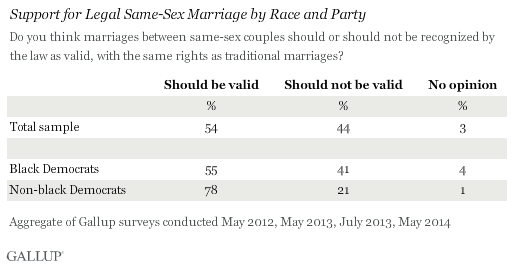
Proponents of same-sex marriage have positioned the issue as a matter of civil rights, and the arguments heard this week before the Supreme Court played out on a legal canvas. The decision that will be forthcoming from SCOTUS this June on same-sex marriage will be a legal one. Yet, for a not insubstantial minority of Americans, the issue is not a legal one, but rather a moral and religious issue.
The process of using the Bible and religious teachings as the basis for decisions on what should be normative and/or legal in a society is not new, and biblical prooftexting of positions on issues is as old as the Bible itself. It is not a clear cut process. For example, some proponents of same-sex marriage in fact argue that taking religion and the teachings of the Bible seriously doesn't lead to a condemnation of same-sex relations and same-sex marriage, but rather support for these positions.
What we do know is that the power of religion as a foundation for views of life, culture and society can be profound, and certainly is in this situation, as seen in the attitudes of black Democrats. It is an element of the debate that same-sex marriage proponents most likely will need to continue to confront head-on in the months ahead.
